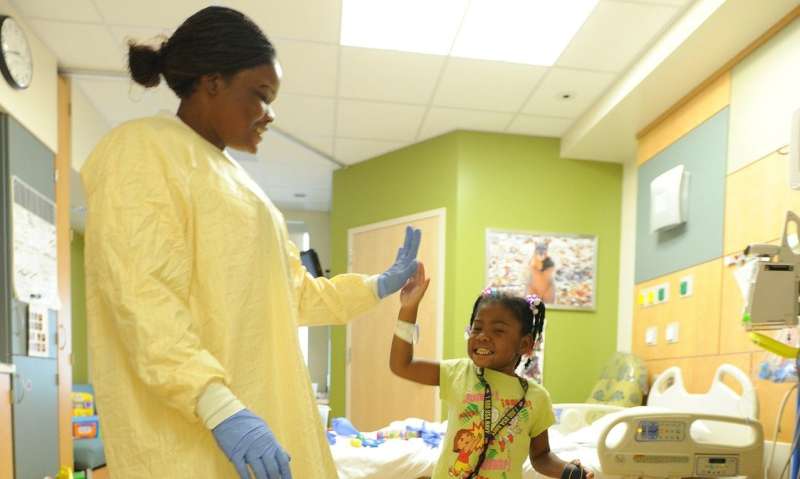Liquid biopsy study could help future treatment of rare brain cancers in children

Diffuse intrinsic pontine glioma (DIPG) is a rare childhood brain cancer that develops deep within the brain stem and penetrates into healthy brain tissue, rendering surgical removal impossible. To monitor this disease, a biopsy using a thin needle inserted through a tiny hole drilled in the skull is technically possible, but risky, and if successful would only capture a one-time snapshot of the tumor.
To better understand how a DIPG tumor progresses and how it responds to treatment, researchers at the Translational Genomics Research Institute (TGen), an affiliate of City of Hope, have launched a research study entitled See the Change to study DIPG at the molecular level.
If successful, physicians in the future would have a non-invasive method for monitoring treatment response and metastasis in children with DIPG, which affects as many as 300 American children and young adults annually.
In the See the Change study, researchers will examine short fragments of DNA shed from DIPG tumors found in the bloodstream to see if using this method of liquid biopsy could accurately diagnose and monitor the disease, understand the type of mutations driving each cancer, and track the cancer in real time to determine if ongoing treatment is controlling the tumor, or not. However, since this method is still being tested, the results of this study will not be used for determining treatment options.
"Up until now, physicians have used imaging methods to assess how well a given treatment might be working. But these are often late assessments that offer no insights into how a tumor might be escaping treatment," said Dr. Michael Berens, TGen Deputy Director and head of TGen DIPG research. "We believe our new See the Change study, testing the possibilities of using a liquid biopsy, will reveal essential knowledge about each child's tumor and how it responds to various new treatments."
A liquid biopsy uses circulating tumor DNA and RNA (ctDNA and ctRNA) to measure genetic markers that precisely represent each patient's tumor.
"Our challenge is that DNA fragments released by brain cancers dissipate quickly in the bloodstream," said Dr. Muhammed Murtaza, Co-Director of TGen's Center for Noninvasive Diagnostics. "Using a TGen-developed technology—TARgeted DIgital Sequencing, or TARDIS—we believe we can more precisely capture and measure these biomarkers and use that information to help treat patients."
TGen's TARDIS technology builds on a related study published Oct. 15 in the journal Clinical Cancer Research, co-authored by Drs. Berens and Winnie Liang, Director of TGen's Collaborative Sequencing Center, which was responsible for the study's decoding of tumor DNA. That study of 48 children, led by the University of California San Francisco and the Children's National Health System, showed that using a blood-test, a liquid biopsy, was lower risk than surgical biopsies, and may allow doctors to measure the effectiveness of treatments even before changes are identified on medical imaging, such as MRI or CT.
Wendy Stanley of San Diego is the mother of a teenage girl with DIPG who is participating in this study.
"Being a part of TGen's program, See the Change, and helping to pioneer the effort toward understanding DIPG by monitoring our daughter's tumor without invasive biopsies is an honor," she said. "Not only are we excited to be a part of this advanced technological research, our daughter is encouraged to know that the study may benefit other victims of this disease."
For more information about this study, contact the clinical research coordinator at DIPG@TGen.org or call 602-343-8653.
More information: Eshini Panditharatna et al. Clinically Relevant and Minimally Invasive Tumor Surveillance of Pediatric Diffuse Midline Gliomas Using Patient-Derived Liquid Biopsy, Clinical Cancer Research (2018). DOI: 10.1158/1078-0432.CCR-18-1345
















